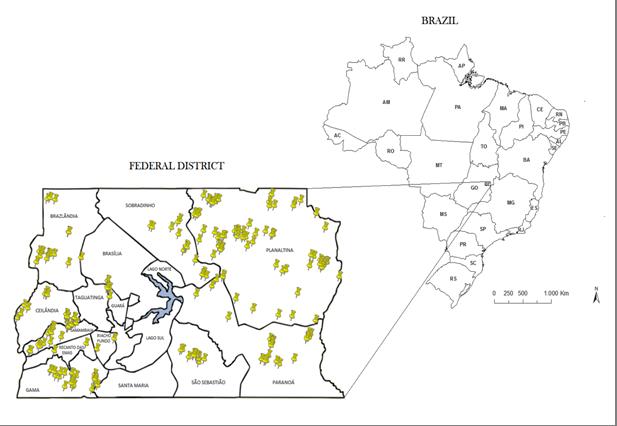Epidemiological study of swine brucellosis in household farms in Federal District of Brazil
DOI:
https://doi.org/10.21708/avb.2019.13.2.8299Resumen
Brucellosis is caused by 10 species of Brucella sp. and is responsible for huge economic losses. There are no specific prophylactic measures present for household pigs, which can be also reservoirs, in the brazilian National Program for the Control and Eradication of Animal Brucellosis and Tuberculosis. Therefore, we conducted a cross-sectional study of blood serum samples from 1793 household pigs from 823 farms in Federal District of Brazil. Serum samples were collected between August and October in 2011, 2012, and 2014 by the veterinarians under the Secretary of Agriculture. The Rose Bengal plate test (RBPT) was used for screening for antibodies against smooth Brucella sp. Positive results were confirmed by the slow agglutination test (SAT) and 2-mercaptoethanol test (2-ME). Among the 1793 samples screened with RBPT, 125 were positive for antibodies against smooth Brucella sp.; 46 (32%) of these samples showed agglutination in SAT, but only one (0.8%) sample was considered positive by 2-ME. The animal with the positive blood serum was traced back in a household farm whose owner had supplemented feeds with cow milk whey. For preventing swine brucellosis, it is necessary to prevent the cross-infection either by the consumption of contaminated cow milk or by direct contact with infected animals. The government policy should enhance the sanitary education for encouraging household farmers to employ prophylactic measures and ensure biosecurity. The present study results indicate that swine brucellosis risk in household farms occurs in a low prevalence rate in pigs from the Federal District of Brazil.
Descargas

Descargas
Publicado
Número
Sección
Licencia
Autores que publicam na Acta Veterinaria Brasilica concordam com os seguintes termos: a) Autores mantém os direitos autorais e concedem à revista o direito de primeira publicação, com o trabalho simultaneamente licenciado sob a Licença Creative Commons Attribution que permite o compartilhamento do trabalho com reconhecimento da autoria e publicação inicial nesta revista. b) Autores têm autorização para assumir contratos adicionais separadamente, para distribuição não-exclusiva da versão do trabalho publicada nesta revista (ex.: publicar em repositório institucional ou como capítulo de livro), com reconhecimento de autoria e publicação inicial nesta revista. c) Autores têm permissão e são estimulados a publicar e distribuir seu trabalho online (ex.: em repositórios institucionais ou na sua página pessoal) a qualquer ponto antes ou durante o processo editorial, já que isso pode gerar alterações produtivas, bem como aumentar o impacto e a citação do trabalho publicado (Veja O Efeito do Acesso Livre).


 Esta obra está licenciada com uma Licença
Esta obra está licenciada com uma Licença 